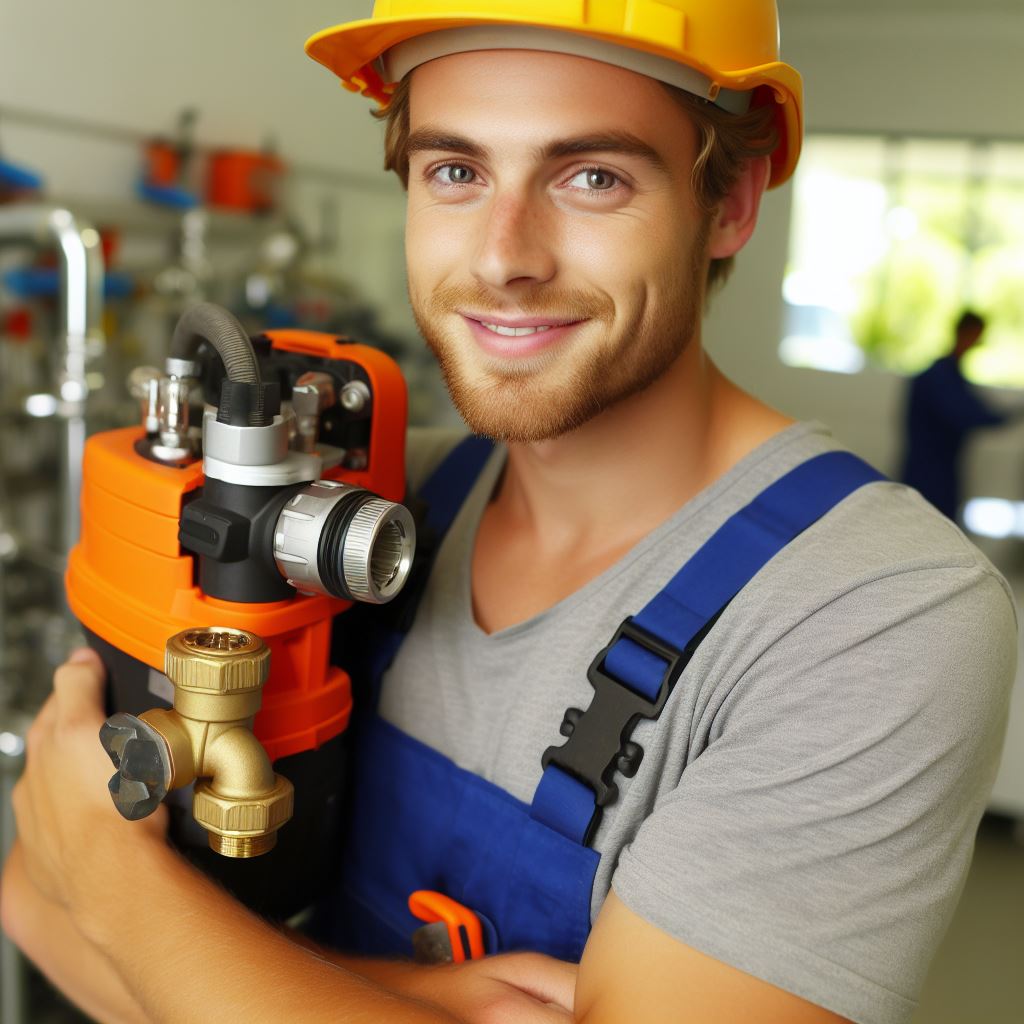Introduction
Welcome to today’s blog post where we will explore the fascinating world of an Aussie plumber.
In this section, we aim to shed light on the purpose and importance of plumbers in Australia, as well as the significance of understanding their daily routine.
Plumbers play a crucial role in maintaining our modern infrastructure, ensuring the smooth functioning of our homes, businesses, and public spaces.
They are the unsung heroes who keep our water flowing, our pipes clear, and our sanitation systems functioning optimally.
Understanding the daily routine of an Aussie plumber is essential for appreciating the challenges they face and the dedication required to excel in their profession.
From the crack of dawn to late into the evenings, plumbers are on the go, addressing emergencies, conducting repairs, and installing new plumbing systems.
Each day presents a unique set of tasks for a plumber, ranging from unclogging toilets and fixing leaking pipes to installing complex water heating systems and conducting site inspections.
Their work requires technical skills, problem-solving abilities, and a deep knowledge of plumbing codes and regulations.
By delving into the daily life of an Aussie plumber, we gain a deeper appreciation for the expertise they bring to the table and the essential services they provide.
So, let’s take a journey through their day, exploring the challenges, rewards, and hard work that make plumbers an integral part of our society.
Overview of a Plumber’s Responsibilities
A plumber is a skilled tradesperson who specializes in installing and repairing pipes, fixtures, and other plumbing systems.
They play a crucial role in maintaining the functionality and safety of households and businesses.
Main tasks and responsibilities
Installation and repair of water supply systems, including pipes, fittings, and fixtures.
- Maintenance of drainage and waste disposal systems, ensuring proper flow and prevention of blockages.
- Inspection and testing of plumbing systems to identify issues and ensure compliance with regulations.
- Repair or replacement of faulty or damaged plumbing components, such as faucets, toilets, and water heaters.
- Collaboration with other construction professionals, such as architects or electricians, to ensure efficient project completion.
- Responding to emergency calls to fix burst pipes, leaks, or other plumbing emergencies.
- Advising clients on proper usage and maintenance of plumbing systems to prevent future problems.
A diverse range of jobs handled by plumbers
- Residential plumbing: Installing and repairing pipes, fittings, and fixtures in homes.
- Commercial plumbing: Handling larger-scale plumbing systems in commercial buildings, such as offices or hotels.
- Industrial plumbing: Dealing with specialized plumbing systems in factories, manufacturing plants, or warehouses.
- Gas fitting: Installing and maintaining gas supply lines for stoves, boilers, and other gas-powered appliances.
- Hot water system installation: Setting up water heaters and ensuring they function properly.
- Drain cleaning: Removing blockages and ensuring proper drainage flow to prevent water damage and health hazards.
- Renovations and remodeling: Assisting in plumbing modifications or upgrades during construction projects.
The importance of a plumber’s work for households and businesses
Plumbers play a crucial role in ensuring the overall well-being and comfort of households and businesses.
Without their expertise, plumbing systems could malfunction, causing disruptions, damage, and even health hazards.
They help maintain a clean and hygienic environment by ensuring proper waste disposal and preventing water contamination.
Additionally, their work guarantees access to clean water for cooking, cleaning, and sanitation.
Plumbers also contribute to the efficiency and productivity of businesses by maintaining functional plumbing systems.
Faulty plumbing can disrupt operations, leading to potential financial losses.
Skilled plumbers help prevent such setbacks and ensure smooth business operations.
In essence, a plumber’s responsibilities encompass various crucial tasks, ranging from installation and maintenance to repair and emergency response.
Their expertise is fundamental to the safety, functionality, and well-being of households and businesses alike.
Starting the day
The Typical Start Time for Plumbers
The life of a plumber is one of early starts and timely responses to the plumbing needs of clients.
While the exact start time can vary among plumbers, a common practice is to kick off the day between 7:00 AM and 8:00 AM.
This early start ensures that plumbers can efficiently navigate through their workload, addressing both scheduled appointments and unexpected emergency calls.
The importance of punctuality in their profession
Punctuality is a cornerstone of the plumbing profession. Clients often reach out to plumbers when faced with urgent issues, such as leaks, burst pipes, or malfunctioning water heaters.
A plumber’s ability to arrive promptly not only speaks volumes about their professionalism but also plays a crucial role in minimizing the inconvenience and potential damage caused by plumbing problems.
Being on time is a commitment to customer satisfaction and reliability, establishing trust with clients and building a positive reputation in the community.
The need for planning and organizing their workload for the day
In the realm of plumbing, planning and organization are indispensable skills that contribute significantly to a plumber’s success.
Before embarking on the day’s tasks, plumbers often take the time to review their schedule, assess the priority of each job, and allocate time accordingly.
This strategic approach allows them to manage their workload effectively, ensuring that they can navigate through multiple projects without compromising the quality of their work.
Furthermore, a well-organized plumber considers the tools and materials needed for the day’s assignments.
Preparing equipment in advance minimizes downtime and optimizes efficiency, enabling plumbers to complete tasks with the precision and speed required in their field.
This foresight also helps them respond promptly to unexpected challenges that may arise during the course of their work.
The intricate planning involved in a plumber’s daily routine is not merely a matter of logistics but an essential aspect of delivering excellent service.
It empowers plumbers to anticipate potential issues, allocate resources efficiently, and provide solutions in a timely manner.
As plumbing systems become more complex and clients seek prompt and reliable services, the ability to plan and organize workloads becomes increasingly critical.
In short, the typical start time for a plumber, usually in the early morning, sets the tone for a day filled with punctuality and efficiency.
Punctuality is not just a matter of showing up on time; it is a commitment to professionalism and client satisfaction.
Effective planning and organization enable plumbers to navigate workloads precisely, respond promptly to emergencies, and maintain a reliable community reputation.
Getting Equipped
The essential tools and equipment plumbers use
Plumbers use a variety of essential tools and equipment to perform their job efficiently. Here are some of the most common ones:
- Pipe Wrench: This adjustable tool is used for gripping and turning pipes and fittings.
- Plunger: A plumber’s best friend for unclogging toilets and drains.
- Pipe Cutter: Used to cut pipes and create clean and precise openings.
- Torch: Plumbers use a torch to solder pipes and fittings together.
- Pipe Threader: Essential for creating threaded connections, especially in gas and water lines.
- Tape Measure: Accurate measurements are crucial in plumbing installations and repairs.
- Auger: This tool is used to clear stubborn clogs in pipes by breaking them up.
- Channel Locks: These adjustable pliers are useful for gripping and turning different-sized fittings.
- Handheld Drain Snake: It helps to remove debris and clogs from drains.
- Caulking Gun: Plumbers use this tool to apply caulk around tubs, showers, and sinks for a watertight seal.
The importance of safety gear, such as gloves and goggles
Safety gear is of utmost importance for plumbers due to the hazardous nature of the job. Some essential safety equipment includes:
- Gloves: Protect hands from chemicals, sharp objects, and hot pipes.
- Goggles: These protect the eyes from debris, chemicals, and other hazards.
- Protective Clothing: Plumbers wear coveralls or long-sleeved shirts and pants to shield their skin.
- Hard Hat: Essential for protection against falling objects or head injuries in confined spaces.
- Ear Protection: Plumbers work with loud equipment, so wearing earplugs is crucial for preventing hearing damage.
Maintaining and replenishing equipment
Maintaining and replenishing equipment regularly is crucial for plumbers. Here’s why:
- Efficiency: Well-maintained tools and equipment perform better, leading to faster and more effective work.
- Safety: Regular maintenance ensures that equipment is functioning correctly, reducing the risk of accidents.
- Durability: Proper maintenance extends the lifespan of tools, saving plumbers money in the long run.
- Professionalism: Maintaining tools shows clients that plumbers take their job seriously and care about quality.
- Reliability: Replenishing worn-out or damaged equipment ensures that plumbers can always rely on their tools.
In fact, a day in the life of an Aussie plumber involves using a wide range of tools and equipment.
Safety gear is crucial, and maintaining and replenishing equipment regularly is essential for efficiency and professionalism.
Plumbers play a vital role in our society, ensuring the proper functioning of our water and drainage systems.
Traveling to the first job
Plumbers move between different job sites
Plumbers embark on a dynamic journey as they navigate between diverse job sites, a process intricately woven into the fabric of their daily routine.
The choice of transportation modes, predominantly characterized by the utilization of vans or trucks, emerges not merely as a pragmatic decision but as a strategic facet influencing their operational efficiency.
Efficient navigation and time management
The seamless movement between locations is a choreography of logistical considerations, underlining the imperative need for a delicate equilibrium between efficient navigation and adept time management.
The vehicle, once a mundane conveyance, transforms into a vital tool in the plumber’s repertoire, shaping their ability to respond promptly and effectively to the demands of each assignment.
The common modes of transportation used (e.g., vans, trucks)
The significance of this transportation strategy extends beyond the physical act of moving from one place to another; it underscores a holistic approach to service delivery.
Plumbers must meticulously plan routes and schedules to optimize travel, ensuring timely arrivals and efficient resource utilization for diverse workloads.
This intricate dance of logistics serves as the backbone of a plumber’s operational framework, fostering an environment where they can execute their tasks with meticulous precision.
They orchestrate a precise dance of time, space, and resources, aiming to boost productivity and uphold a reliable community reputation through strategic relocation.
Job site arrival
The steps taken upon reaching the job site
Upon reaching the job site, the plumber follows a series of steps to assess the situation and gather information. Effective communication with the client is crucial for a successful outcome.
Your Personalized Career Strategy
Unlock your potential with tailored career consulting. Get clear, actionable steps designed for your success. Start now!
Get StartedFirstly, the plumber parks the vehicle in a safe and convenient location nearby. They ensure that the parking does not obstruct traffic or cause inconvenience to others.
Next, the plumber gathers the necessary tools and equipment from their vehicle. They double-check to ensure that they have all the required items before proceeding to the job site.
Plumbers assess the situation and gather information
Afterward, the plumber approaches the client’s property and introduces themselves in a friendly and professional manner.
Building trust and rapport from the beginning is essential for effective communication.
The plumber carefully listens to the client’s description of the issue or project requirements.
They encourage the client to provide as much detail as possible to ensure a thorough understanding.
Once the initial information is provided, the plumber conducts a visual inspection of the job site. They examine the plumbing fixtures, pipes, drains, and any other relevant components.
During the inspection, the plumber pays attention to any visible signs of damage or wear.
They may take notes or pictures to document the existing conditions and assist in formulating an appropriate solution.
To gather more information, the plumber may ask the client additional questions related to the plumbing problem. This helps in identifying the root cause and determining the best course of action.
The importance of effective communication with the client
Effective communication with the client is vital at this stage.
The plumber explains the inspection process, the potential issues they have identified, and proposes potential solutions.
The plumber ensures that they use straightforward language without technical jargon, making it easy for the client to understand.
They encourage the client to ask questions and address any concerns they may have.
Once the plumber has gathered all the necessary information, they discuss the available options with the client.
They provide a detailed breakdown of the costs involved, the time frame for completion, and any potential disruptions.
During this discussion, the plumber actively listens to the client’s input, concerns, and preferences.
They take note of any specific instructions or requests the client may have.
Transparency is crucial in this phase.
The plumber ensures that the client understands the potential risks, benefits, and limitations of each option presented.
Once an agreement is reached, the plumber informs the client about the next steps in the process.
They provide a timeline for the work to be carried out and explain any necessary preparations required from the client.
Before leaving the job site, the plumber reiterates the importance of ongoing communication.
They ensure the client knows how to reach them if any questions or issues arise during the project.
In a nutshell, upon reaching the job site, the plumber follows a systematic approach to assess the situation and gather information.
Effective communication with the client plays a significant role in understanding their needs, proposing solutions, and ensuring a successful outcome.
Executing plumbing tasks
Executing plumbing tasks involves a wide range of activities that require specific skills and attention to detail.
Throughout the day, plumbers encounter various challenges that require problem-solving and critical thinking abilities.
Examples of common plumbing tasks
Here are some common plumbing tasks performed by Aussie plumbers on a daily basis:
- Fixing Leaky Faucets: Plumbers often start their day by addressing leaky faucets, which can waste a significant amount of water if left unrepaired.
- Clearing Clogged Drains: Another common task is unclogging drains, whether it’s the kitchen sink, bathroom tub, or toilet. Plumbers may use specialized tools like drain snakes or hydro jetting to remove the blockage.
- Repairing Burst Pipes: Burst pipes can cause significant water damage and need immediate attention. Plumbers must identify and fix the damaged section or replace it if necessary.
- Installing or Repairing Water Heaters: Plumbers are responsible for installing new water heaters or repairing faulty ones. This includes connecting the electrical or gas supply, fitting the tank, and ensuring proper functioning.
- Detecting and Repairing Water Leaks: Plumbers use various techniques to detect water leaks, such as using thermal imaging cameras. Once located, they repair the leaks to prevent further damage.
- Fixing Toilets: Plumbers frequently handle toilet repairs, including fixing running or leaking toilets, replacing broken parts, or unclogging the toilet if a plunger won’t do the job.
- Installing or Repairing Plumbing Fixtures: Plumbers are skilled in installing or replacing various fixtures like sinks, faucets, showers, and toilets. They ensure proper installation and functionality.
- Dealing with Sewage Systems: Plumbers are equipped to deal with sewage system issues, such as blockages, leaks, or backups. They may need to use sewer cameras to locate the problem.
- Maintaining Piping Systems: Routine maintenance of piping systems is crucial to prevent future problems. Plumbers inspect pipes, check for corrosion or leaks, and perform necessary repairs or replacements.
- Assisting with Renovations or New Construction: Plumbers, crucial in constructing or renovating structures, install plumbing systems, verify connections, and adhere to building codes.
The need for problem-solving and critical-thinking skills
Executing these plumbing tasks requires problem-solving and critical thinking skills.
Plumbers must assess the situation, identify the root cause of the problem, and develop appropriate solutions.
Additionally, attention to detail is crucial in plumbing work.
Even a minor mistake or oversight can lead to leaks, water damage, or improper functioning.
Plumbers need to focus on every detail, ensuring connections are secure, fittings are tight, and all components are installed correctly.
Attention to detail also ensures high-quality workmanship, which is essential for customer satisfaction and the reputation of a plumber or plumbing company.
By delivering excellent results, plumbers build trust with customers and foster long-term relationships.
Basically, executing plumbing tasks involves a variety of common activities throughout the day.
Plumbers rely on their problem-solving and critical thinking skills to troubleshoot and fix various issues.
Attention to detail is vital to ensure the delivery of high-quality work.
The work of an Aussie plumber is essential in maintaining the functionality and integrity of water and sewage systems.
Working in different environments
Plumbers in Australia work in various settings, including residential and commercial environments. Each setting comes with its own challenges and benefits.
Here is an overview of the diverse environments that plumbers encounter and the need for adaptability and flexibility in this profession:
Residential Settings
- Plumbers often work in residential homes, fixing and maintaining plumbing systems.
- They encounter a range of challenges, such as dealing with old pipes, clogged drains, and leaky faucets.
- The benefit of working in residential settings is the opportunity to directly assist homeowners and improve their quality of life.
- Plumbers need to be adaptable and flexible to work efficiently in different types of residential properties, such as houses, apartments, and condominiums.
Commercial Settings
- Plumbers also work in commercial establishments like offices, factories, and retail stores.
- In these settings, they face unique challenges, such as handling larger pipes, complex layouts, and high water pressure systems.
- The benefit of working in commercial settings is the opportunity to contribute to the smooth functioning of businesses and supporting the economy.
- Plumbers must adapt to the specific requirements of each commercial establishment and efficiently address plumbing issues that could disrupt business operations.
Construction Sites
- Plumbers play a vital role in construction projects, ensuring proper installation of plumbing systems in new buildings.
- They encounter the challenge of coordinating their work with other contractors and adapting to the project’s timeline.
- The benefit of working on construction sites is the chance to be involved in creating new infrastructure and contributing to urban development.
- Plumbers need to be highly adaptable in managing the constantly changing environment of construction sites, as they often face unexpected challenges and tight schedules.
Emergency Response
- Plumbers are also called upon for emergency repairs, such as burst pipes, gas leaks, and sewer backups.
- They face the challenge of working under high-pressure situations, where quick thinking and effective problem-solving are crucial.
- The benefit of emergency response work is the ability to provide immediate assistance and prevent further damage or health risks.
- Plumbers must be flexible, ready to respond at any time, and adapt to the specific conditions they may encounter while addressing urgent plumbing issues.
Adaptability and flexibility
In every setting, adaptability and flexibility are essential traits for plumbers:
- They need to be knowledgeable about various plumbing systems and techniques to adapt to the specific requirements of each environment.
- Plumbers must be flexible in their work schedules, as emergencies can arise at any time, and they may need to adjust their plans accordingly.
- Adapting to different work environments allows plumbers to broaden their knowledge and expertise, making them more versatile professionals.
Generally, plumbers in Australia work in diverse settings, such as residential homes, commercial establishments, construction sites, and emergency situations.
Each environment comes with its challenges and benefits.
Adaptability and flexibility are crucial traits for plumbers to successfully navigate and excel in their profession.
Stand Out with a Resume That Gets Results
Your career is worth more than a generic template. Let us craft a resume and cover letter that showcase your unique strengths and help you secure that dream job.
Get HiredRead: Plumbing 101: A Beginner’s Guide in Australia
Interacting with Clients
Effective Communication and Collaboration
As an Aussie plumber, communicating and collaborating with clients is vital to a successful job completion.
We ensure clear communication by actively listening to clients’ concerns and understanding their plumbing needs.
Collaborating with clients allows us to explain the process, present solutions, and address any queries or doubts.
Through open and honest communication, we build trust with clients, establishing a professional rapport.
Maintaining a Professional and Friendly Demeanor
Maintaining a professional and friendly demeanor is crucial for Aussie plumbers during client interactions.
We arrive at appointments punctually, respecting the client’s time and demonstrating our commitment to the job.
Smiling and engaging in polite conversation create a welcoming atmosphere that eases any potential client discomfort.
A friendly attitude helps us connect with clients, making them feel comfortable while discussing their plumbing issues.
Significance of Customer Satisfaction
Customer satisfaction is paramount to us, as it determines our success in gaining repeat business and referrals.
Ensuring clients are content with our services fosters loyalty and positive word-of-mouth recommendations.
By providing high-quality workmanship and demonstrating expertise, we aim to exceed client expectations.
We understand that satisfied customers are more likely to refer us to their friends, family, and colleagues.
Overall Importance of Client Interaction
Interacting with clients is an integral part of an Aussie plumber’s daily routine and business strategy.
By actively listening, collaborating, and maintaining a friendly demeanor, we establish trust and credibility.
It allows us to address clients’ concerns effectively, find optimal solutions, and ensure their satisfaction.
Positive client interactions not only lead to repeat business but also serve as a valuable marketing tool through referrals.
Ultimately, our success as plumbers relies heavily on the relationships we build with our clients.
Read: Top Plumbing Trends in Australian Engineering

Lunch break and downtime
The life of an Aussie plumber can be demanding and hectic, but they also understand the importance of taking breaks to recharge and refuel.
Managing lunch breaks during the workday
- Plumbers typically plan their lunch breaks strategically to ensure minimal disruption to their work.
- They schedule their breaks around clients’ needs, aiming to complete tasks before taking a well-deserved break.
- In case of emergencies, plumbers may have to delay or shorten their lunch breaks to attend to urgent plumbing issues.
- However, it is important for plumbers to prioritize their own well-being and find time to nourish themselves during the day.
The importance of taking breaks for rest and refueling
- Breaks provide plumbers with an opportunity to rest their bodies and minds, preventing burnout.
- Taking the time to refuel with a healthy meal or snack helps maintain their energy levels and concentration.
- By stepping away from the job for a short period, plumbers can return refreshed and more focused on the tasks at hand.
- Rest and refueling not only benefit the plumber but also contribute to the overall efficiency and quality of their work.
Downtime for administrative tasks or continuing education
- During downtime, plumbers may use the opportunity to complete administrative tasks.
- This includes processing paperwork, scheduling appointments, or updating clients on the progress of their projects.
- Some plumbers also take advantage of their free time to engage in continuing education.
- They may read industry publications, attend workshops, or participate in training programs to enhance their skills and knowledge.
- Continuous learning is crucial for plumbers to stay up-to-date with the latest advancements in plumbing technology and techniques.
To summarize, lunch breaks and downtime play an essential role in the life of an Aussie plumber.
Manage breaks thoughtfully, rest to refuel, and use downtime for admin tasks or education to maintain well-being, productivity, and field competence.
Read: How to Become a Plumber in Australia
Wrapping up the day
Completing a job
As the day concludes, the meticulous process of completing a job and preparing for the next one unfolds.
This intricate procedure encompasses the finalization of tasks, ensuring that all elements are meticulously attended to and that the groundwork is laid for a seamless transition to the upcoming project.
The importance of cleanliness and tidying up the work area
An integral aspect of this post-task phase is the emphasis on cleanliness and the tidying up of the work area.
Professionals actively maintain clean workspaces by storing tools, clearing surfaces, and addressing hazards or clutter.
This not only contributes to a safer working environment but also sets the stage for a more efficient and productive start to the next assignment.
Paperwork or documentation required
Simultaneously, attention is directed towards the essential paperwork and documentation requirements.
Diligence in completing necessary forms, recording pertinent details, and ensuring that all documentation is accurate and up-to-date is a crucial component of the wrap-up process.
This meticulous approach not only serves regulatory and compliance purposes but also provides a comprehensive record of the work undertaken, facilitating future reference and analysis.
Choreograph your day’s end: complete tasks, organize your workspace strategically, and handle paperwork meticulously.
This holistic approach ensures not only the immediate success of the current project but also lays the groundwork for continued excellence in the professional endeavors that lie ahead.
Read: The Future of Plumbing Tech in Australia
Find Out More: The Role of Builders in Urban Development
Transform Your LinkedIn for Maximum Impact
Elevate your professional brand with a LinkedIn profile that attracts recruiters, showcases your expertise, and maximizes opportunities. Stand out in your industry with a profile built for success.
Boost ProfileLearn More: Welder Certification in Australia: What You Need
Discover More: Australian Carpentry Regulations Update
Challenges and Rewards of Being a Plumber
Challenges Faced by Plumbers in Their Daily Work
- Dealing with plumbing emergencies, such as pipe bursts and leaks, that require immediate attention.
- Navigating tight spaces and crawl spaces to access plumbing systems for repairs and installations.
- Working in different weather conditions, whether it’s scorching heat or freezing cold.
- Handling unpleasant odors and working with sewage systems that can be unhygienic.
- Solving complex plumbing problems that require troubleshooting skills and critical thinking.
- Interacting with clients who may be stressed or frustrated due to plumbing issues in their homes or businesses.
- Managing time efficiently to complete multiple tasks and appointments within a day.
Physical Demands and Potential Hazards
- Lifting heavy pipes, tools, and equipment, which can put a strain on the plumber’s back and muscles.
- Bending, kneeling, and crouching for extended periods, leading to joint and muscle discomfort.
- Exposure to potentially harmful chemicals and substances, such as asbestos and lead, during plumbing work.
- Operating power tools and machinery with precision and caution to avoid accidents and injuries.
- Working in confined spaces increases the risk of accidents and can cause claustrophobia.
- Ensuring safety measures are followed, such as wearing protective gear, to minimize exposure to hazards.
Rewards of Being a Plumber
- Job satisfaction from solving complex plumbing problems and restoring functionality to homes and businesses.
- Opportunities for growth and advancement, such as becoming a master plumber or starting your own plumbing business.
- Earning a competitive salary, especially with experience and specialization in niche areas of plumbing.
- Helping people in need by providing essential services that improve their quality of life.
- Enjoying a varied workday with different tasks and challenges, keeping the job exciting and engaging.
- Being part of a skilled trade that is always in demand, ensuring job security and stability.
- Working independently or collaboratively with a team, fostering a sense of autonomy or camaraderie.
Therefore, being a plumber comes with its fair share of challenges and hazards.
However, the rewards, including job satisfaction, opportunities for growth, and the ability to make a positive impact on people’s lives, make it a fulfilling and worthwhile profession.
Plumbers are everyday heroes who keep our water systems functioning and ensure the comfort and safety of our homes and businesses.
Conclusion
In closing, this blog post has delved into various aspects highlighting the indispensable role that plumbers play in our society.
We’ve discussed their multifaceted contributions, emphasizing the significance of their work in ensuring the functionality and efficiency of essential infrastructure.
Recognizing the pivotal role of plumbers goes beyond mere acknowledgment; it entails appreciating the intricate and often challenging tasks they undertake daily.
From fixing leaks to ensuring proper water circulation, plumbers contribute significantly to the overall well-being of communities.
In light of this, it is essential for readers to broaden their perspective and recognize plumbing not just as a service but as a viable and fulfilling career option.
Encouraging an appreciation for the skills, dedication, and problem-solving abilities of plumbers can potentially inspire individuals to consider plumbing as a profession.
Let’s actively celebrate the unsung heroes who maintain our plumbing systems, inspiring a new generation to choose plumbing as a valuable career.




